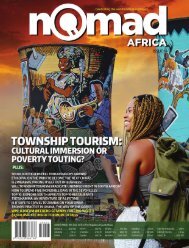Nomad_Africa_Edition12
Born from a passionate desire to dispel the negative perceptions which the world has held of the African Continent, and to replace it with a positive focus, Nomad Africa magazine celebrates life on the African continent. Covering stories from all countries and all cultures, it strives to include unique tourist attractions, business development, technology and investment opportunities as well as looking at the continent's cultural heritage. Nomad Africa inspires and breeds a conscious, knowledgeable generation of visionaries among our own, and influences positive perceptions and appreciation for the true worth of Africa worldwide.
Born from a passionate desire to dispel the negative perceptions which the world has held of the African Continent, and to replace it with a positive focus, Nomad Africa magazine celebrates life on the African continent. Covering stories from all countries and all cultures, it strives to include unique tourist attractions, business development, technology and investment opportunities as well as looking at the continent's cultural heritage. Nomad Africa inspires and breeds a conscious, knowledgeable generation of visionaries among our own, and influences positive perceptions and appreciation for the true worth of Africa worldwide.
Create successful ePaper yourself
Turn your PDF publications into a flip-book with our unique Google optimized e-Paper software.
MAURITIUS<br />
HOLDS AFRICA’S FIRST INTERNATIONAL CONFERENCE<br />
ON DIGITALISATION AND SUSTAINABLE TOURISM<br />
The first International Conference on Digitalisation and Sustainable<br />
Tourism was recently held at the Le Méridien Hotel, Pointe aux Piments, in<br />
Mauritius. The 2-day high profile event attracted decision-makers and<br />
stakeholders from all spheres within the tourism industry internationally including a<br />
number of <strong>Africa</strong>n countries, and was hosted by the Mauritius Ministry of Tourism with<br />
well over 400 delegates in attendance.<br />
Words: DIETER GÖTTERT<br />
tourism is a major source of<br />
income globally, especially<br />
for smaller countries that<br />
have a rich diversity of offerings<br />
for international travellers,<br />
yet current issues of<br />
climate change, sustainability<br />
and digitalisation together<br />
with super rapid progress in<br />
the data and information technology sectors<br />
are exerting a profound impact on tourism<br />
worldwide.<br />
The conference provided an ideal platform<br />
for invited experts to share their views and<br />
insight in terms of balancing and paving the<br />
way forward in a digital age, where all<br />
global tourism stakeholders will be able to<br />
harness opportunities, while sustaining the<br />
tourism industry into the future.<br />
Officially opened by Mauritian Prime Minster<br />
Pravind Jugnauth, in the presence of notable<br />
VIP guests such as President Didier Robert<br />
of Reunion, Catherine Abelema Afeku - Minister<br />
of Tourism, Arts & Culture of Ghana, Adil<br />
Hamid Daglo Mussa of the Republic of<br />
Sudan; Richard Via of Madagascar, Fekitamoeloa<br />
Utoikamanu - the United Nations<br />
Under Secretary-General and High Representative<br />
of the Least Developed Countries,<br />
Dr Dirk Glaesser of the UNWTO, Alain<br />
St.Ange - former Seychelles Minister of<br />
Tourism, Pascal Viroleau - CEO of the Vanilla<br />
Islands, and the Mauritian Minister of<br />
Tourism, Mr Anil Gayan.<br />
The conference offered a very impressive<br />
line-up of expert speakers, with the first plenary<br />
session and keynote address by Professor<br />
Geoffrey Lipman, President of the<br />
International Coalition of Tourism partners.<br />
In an exclusive interview with <strong>Nomad</strong> <strong>Africa</strong><br />
Magazine, Professor Lipman emphasised<br />
and heeded the call for climate change<br />
awareness and what needs to be done<br />
about the these challenges: “ In my presentation,<br />
I was trying to bring to this audience<br />
the realities of what climate change means<br />
for our world. The trends are very clear and<br />
we have been putting a blanket of carbon<br />
around the world in simple terms, and the<br />
consequence of that is that it is changing our<br />
weather patterns.”<br />
“We are seeing more hurricanes, more<br />
flooding, more heat waves. We are actually<br />
seeing disruption and what is clear is that it<br />
is going to be more and more intense and<br />
irregular and the consequence of that is that<br />
we have problems with water and food production.”<br />
Professor Lipman also emphasised an urgent<br />
need for co-operation and adherence to the<br />
Paris Agreement, which aims to achieve the<br />
long-term goals of global greenhouse gas<br />
emissions mitigation, adaptation to hopefully<br />
curb the increase the global average<br />
temperature to well below 2°C above of<br />
pre-industrial levels by significantly reducing<br />
risks and the impacts of climate change.<br />
“With all the long-term framework targets in<br />
place, over time we will be able to moderate<br />
the reductions of carbon around the<br />
world – we cannot stop it, but we can moderate<br />
it. To do that, we have to change our<br />
patterns of consumption and production.<br />
We have 30 to 40 years to do it, but we have<br />
to start now.”<br />
“What is significant is that between 5 and 8<br />
% of carbon emissions come from tourism –<br />
the way that we use energy, the waste we<br />
produce and the patterns of travel that we<br />
create.”<br />
In terms of being sustainable in a digital age,<br />
what does it mean?<br />
“We are arguing that there should be a new<br />
movement called Impact Travel. Until now,<br />
we have been promoting travel as being<br />
something that is only doing good, but in<br />
the last 5-10 years we have come to understand<br />
the negative side – good impact and<br />
bad impact.”<br />
Professor Lipman says, ”It is a disruption because<br />
destinations are becoming more important<br />
than travel and travellers themselves<br />
because when the tourists go home, the<br />
82 | www.nomadafricamag.com | ...Celebrating the world’s richest continent | Issue 12





